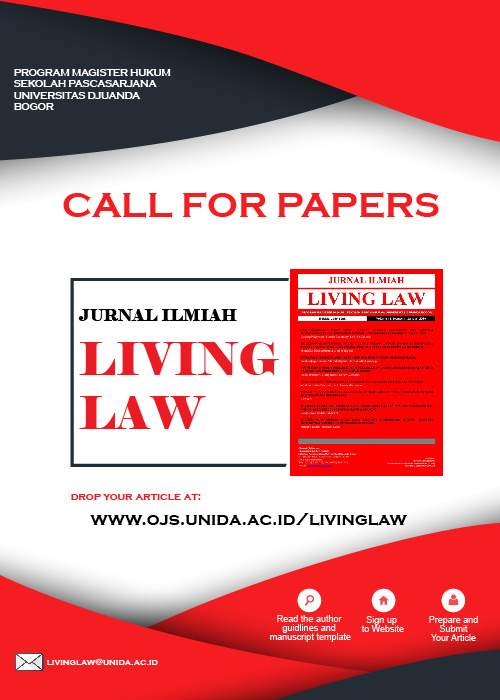About the Journal
Jurnal Ilmiah Living Law is a Peer-Reviewed Journal which is managed by postgraduate school of Djuanda University, majoring of Law Studies. Journal is published twice a year. Focused on Fields of Law, with the scopes are about: Civil Law, Criminal Law, Bussiness Law, Property Law, International Law, Tax Law, etc. Nationally Accredited on SINTA 4 by the Ministry of Research, Technology, and Higher Education of the Republic of Indonesia. For ordering our printed version may be sent a message to livinglaw@unida.ac.id.
 |
P- ISSN: 2085-8078 (Print) E-ISSN: 2550-1208 (Online) In this year (2020), we've changed the publishing period to January and July (instead of January and October).This refers to the results of the editorial board meeting on optimization of journal management. Please submit your article directly to our journal system. Author GuidelinesSubmit Paper Now! |
Accreditation
 |
Indexed By :
Focus and Scope
Jurnal Ilmiah Living Law (e-ISSN number 2550-1208) is a Peer-Reviewed Journal which is managed by postgraduate school of Djuanda University, majoring of Law Studies. Journal is published twice a year (January & July). Focused on Fields of Law, with the scopes are about: Civil Law, Criminal Law, Bussiness Law, Property Law, International Law, Cyber Law, Banking Law, Islamic Economic Law, Tax Law, etc.
Peer Review Process
All manuscripts submitted to this journal Jurnal Ilmiah Living Law must follow Focus and Scope and Author Guidelines of this journal. The submitted manuscripts must fulfil scientific merit or novelty appropriate to the focus and scope of this journal.
Chief Editor and Section Editors will evaluate the submitted papers on prequalification step for the suitability of further review process. The review process used in this journal is Double-blind-peer-review.The manuscripts will be evaluated by two qualified peer reviewers selected by Chief Editor and Section Editors. The peer reviewers should examine the manuscript and return it with their recommendation to the Chief Editor or Section Editors as soon as possible, usually within 3 weeks. If one of peer reviewers recommends rejection, the Chief Editor will ask a third reviewer or Section Editors to decide the acceptance or rejection of the paper. The reviewers give scientific valuable comments improving the contents of the manuscript. Sometimes (if required) a third peer-reviewer is needed to give critical comments to the submitted manuscript.
Papers needing revision will be returned to the authors, and the authors must return the revised manuscript to the Chief Editor via OJS of Jurnal Ilmiah Living Law. Chief Editor sends the revised manuscript to Section Editors to check whether the manuscript is revised as suggested by peer reviewers. Sections Editors could give recommendation to Chief Editor that the manuscript should return to authors, accept, or reject within 2 weeks. After acceptance letter sent by Chief Editor, the manuscript is forwarded to the technical editor for editing and layout process. Chief Editor would send a letter announcing the publication issue to authors.
There are four steps of revision process by authors: 1) revision manuscript to accommodate Section Editors suggestions (prequalification step) within 2 weeks; 2) revision manuscript to accommodate peer reviewer suggestions within 2-4 weeks; 3) revision to accommodate Section Editors suggestions within 2-4 weeks (if any); and 4) revision to accommodate editorial meeting suggestions within 1 week (if any). Manuscripts that exceed the revision deadline will be withdrawn. Authors may request for extension to Chief Editor before the revision expires. The time interval from the date the manuscript is submitted to the acceptance for publication varies, depending on the time required for review and revision process.
The final decision of manuscript acceptance is solely made by Editor in Chief/Regional (Handling) Editor (together with Editorial Board if required) according to reviewers' critical comments. The final decision of the manuscript is solely based on the Editor's final review which considering peer-reviewers comments (but not solely by Reviewer).
Publication of accepted articles including assigning the article to the published issues will be made by Editor in Chief by considering the sequence of accepted date and geographical distribution of authors as well as a thematic issue.
Open Access Policy
This journal provides immediate open access to its content on the principle that making research freely available to the public supports a greater global exchange of knowledge.
This journal is open access journal which means that all content is freely available without charge to users or / institution. Users are allowed to read, download, copy, distribute, print, search, or link to full text articles in this journal without asking prior permission from the publisher or author. This is in accordance with Budapest Open Access Initiative.
Publishing Ethics
Djuanda University through its Master of Law Program developed a peer-reviewed scientific journal as one of the contributions to the development of legal science, specifically business law. Every article published will be reviewed by a peer review board that is an expert in the related field, so this article is published according to editorial standards. Publication Ethics is designed to provide a general picture of the expected behavior of peer reviewers, editors, and writers. The Living Law Scientific Journal is a communication medium between academics, researchers and peer reviewers so that the publisher has the responsibility to maintain the validity and independence of the published research publications. The issuance of a pure decision is determined by the quality of the manuscript and is not influenced by advertising or sponsorship. On the other hand, the blinded review method is applied to the subjectivity review process and can be minimized. Author's Duties Have the responsibility to ensure that the articles are original and new and have never been published in other journals. Not allowed to send any articles that are being reviewed in other journals simultaneously. Only allowed to publish their work elsewhere after receiving a rejection from our journal or if they request to withdraw their work is officially accepted by the journal. Must inform the Editor in Chief or the publisher of any inaccuracies in the data in their published work so that the correction or retraction process of the article can be carried out. Must make a significant contribution before agreeing to review submissions. Can refuse to review any submissions that have a conflict of interest or inadequate knowledge. Review all shipments objectively, fairly and professionally. Ethical violations were found when reviewing the Editor in Chief for further action. Must ensure the originality of a submission and be aware of any excessive plagiarism and publication. Just don't discuss the contents of the post without permission. There is time allocated for the review process. Duties of Editorial Board Members Actively contribute to the development and goodness of the larger journals. Continue to support and promote journals. Review any work assigned to them. Duties of the Editor in Chief Evaluate the text fairly and assign reviewers with appropriate competence. Guaranteed confidentiality of information about the manuscript to anyone other than the people involved in the publishing process. Responsible for deciding when and which articles will be published. Actively seek the views of board members, reviewers and writers on how to improve the image and visibility of the journal. Provide clear instructions to contributors to the authors who according to reviewers selected / identified for the review process.
Journal History
The scientific journal Living Law was initiated by the Master of Law Program at Djuanda University with the Institute for Research and Community Service and published by Djuanda University in 2009 with ISSN 2085-8078. This journal was initially published twice a year, in April and October. In 2015, the scientific journal Living Law changed its publication period to January-October each year and began publishing it online via OJS (Open Journal System). However, the process is still via e-mail and electronically. In 2017, the Living Law Journal has e-ISSN: 2550-1208. Living Law was designated as an accredited scientific journal on July 9, 2018, by the Director General of Strengthening Research and Development No. 21 / E / KPT / 2018 and valid for five years PERIOD: 2016-2020. And in 2020, the Living Law Scientific Journal succeeded in raising its ranking to SINTA 4.
In 2020, we changed the publication period from January-October to January-July as a form of optimizing fully online journal management








